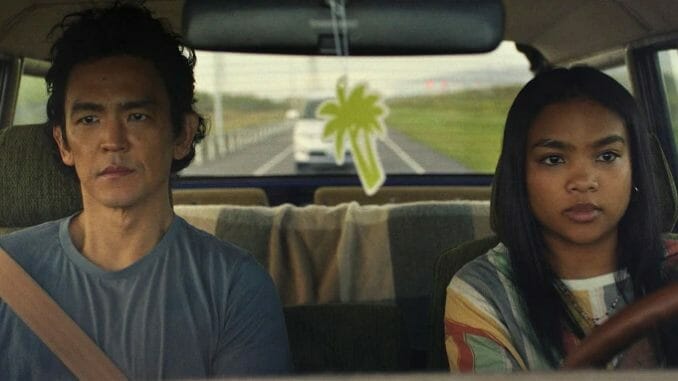
Actress-turned-filmmaker Hannah Marks has an eye for accessible, heartfelt, relationship-based movies—stories about young people that strive for a depth of feeling beyond the Instagram-filter chintziness (or subplot-swollen bloat) of a Netflix-dominated youth-movies market. She’s written and/or directed romances both comic and dramatic, the best of which are Banana Split, which she co-wrote, and also co-stars as one half of a tight friendship that forms between a dude’s ex- and current girlfriends; and After Everything, which she wrote and directed, following a young romance challenged by a cancer diagnosis. I cite these movies as kind of an incantation against the shortcomings of Don’t Make Me Go, which Marks directed but didn’t write, and which has its heart in the right place, even as its head is located somewhere in a dusty screenwriting manual.
Like After Everything, Don’t Make Me Go focuses on how a cancer diagnosis can reorient a relationship, though in this case, the information is concealed from one party in an attempt to make the whole enterprise feel more like a movie. Max (John Cho) is a protective single father to his daughter Wally (Mia Isaac), so when he finds out about a tumor at the base of his skull that will be difficult to safely remove (his options are a year to live, or an extremely risky surgery), his thoughts immediately turn to Wally’s future care. Without telling Wally about his condition, he takes her on a road trip to his college reunion. His secret agenda: Track down Wally’s mother, who left the family when she was a baby, and establish a workable mother-daughter relationship.
Even in this minefield of hoariness—strategically concealed diagnoses; contrast between a buttoned-up, risk-averse parent and a more free-spirited child; metaphorical driving lessons powering an episodic road-trip structure for maximized lesson-learning—there are patches of real poignancy, provided principally by the actors. Though Cho is the right age to play the father of a teenager (and has done so before, in the thriller Searching), it’s still a shock to realize that he also played an uptight guy on a road-trip odyssey in Harold and Kumar Go to White Castle, which in turn brings home Max’s struggle with mortality. Isaac does nice work, too, capturing a cocktail of exasperation and affection that feels true to parent-child relationships. Marks obviously likes her characters, and her actors; she gives them plenty of space, the road-trip antics never pulling focus from Max and Wally.
Don’t Make Me Go premiered at the Tribeca Festival earlier this month, as Marks’ previous film did last year. She should be an ideal Tribeca director; the festival, liberated from the awards cycles that seem to define so many others, favors these kinds of human stories on a genuinely indie budget, stuff that might have been off-season studio releases 20 or 30 years ago. You want to like it, to give in to its potential as an old-fashioned weepie.
But man, this screenplay. Vera Herbert’s work was cited on the industry’s annual Black List, and it shows in the worst way: Obvious contrasts, canned banter, bromides about taking risks, telegraphed plot turns. Even some of its rawest emotional moments feel studiously cribbed from other movies, which is probably why not a single thing any character does throughout Don’t Make Me Go is genuinely surprising or even slightly unexpected. It’s a movie about the unpredictability and inherent dangers of a life well-lived, and you can set a watch to its screenwriting beats.
Marks goes through these motions earnestly, and there are moments on the margins, like Max’s booty-call relationship with Annie (Kaya Scodelario), that have some scrappy, unforced warmth. But most of the visual and verbal personality of Marks’ other work goes missing. Her open-relationship dramedy Mark, Mary & Some Other People, from last year’s Tribeca, eventually became mired in navel-gazing (have any open-relationship indies not?), but it had some savvy comic energy, at least; Banana Split had even more, and played like a sharp little pop song. By comparison, Don’t Make Me Go is a soppy ballad.
Director: Hannah Marks
Writer: Vera Herbert
Starring: John Cho, Mia Isaac, Kaya Scodelario
Release Date: July 15, 2022 (Tribeca)
Jesse Hassenger writes about movies and other pop-culture stuff for a bunch of outlets including The A.V. Club, Polygon, The Week, NME, and SportsAlcohol.com, where he also has a podcast. Following @rockmarooned on Twitter is a great way to find out about what he’s watching, listening to, or eating.